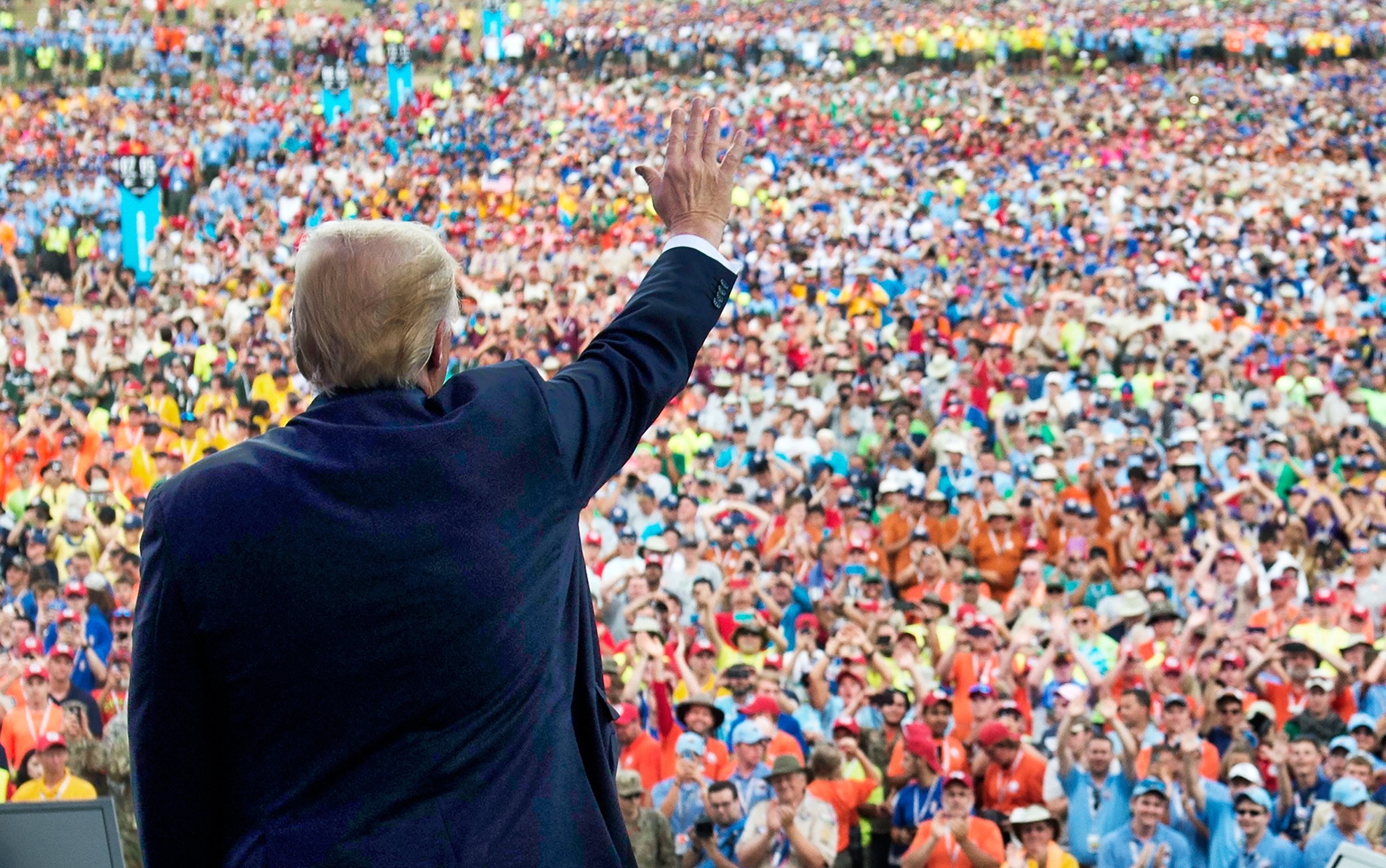
It was a performance review no employee wants to hear, delivered by an angry boss in a setting that broadcast the humiliation. Standing in the Rose Garden on July 25, President Donald Trump excoriated U.S. Attorney General Jeff Sessions for recusing himself from the Russia investigation buffeting Trump’s Administration. “I’m very disappointed with the Attorney General,” the President fumed. Asked if he would fire Sessions, Trump said simply, “Time will tell.”
Trump’s latest bid to expel one of his earliest allies and his call for an investigation into vanquished rival Hillary Clinton may be a defining moment in his young presidency. Beset by multiple, expanding Russia probes, Trump is responding to his legal challenges by picking political brawls. In the span of a few days, he turned the Boy Scouts’ National Scout Jamboree into a partisan rally, sharpened his attack on the integrity of special counsel Robert Mueller and his investigators and hired former hedge-fund executive Anthony Scaramucci to head the White House communications shop. Senior White House advisers objected, citing Scaramucci’s inexperience; press secretary Sean Spicer quit in protest. But the man known as the Mooch had a virtue that Trump prizes above all others: boundless devotion to the boss. As Trump sidelines Washington veterans, Scaramucci is remaking the West Wing by promising to root out and fire leakers.
The question gripping Washington is how far Trump’s norm breaking will trickle down. All over town, traditions of good behavior seem to be crumbling. In the Senate, Republican leader Mitch McConnell broke precedent by forcing a vote on a health care bill whose contents were a mystery even to his colleagues. Instead of drafting legislation through the traditional committee process, Republicans are trying to write and amend the bill on the Senate floor. The final vote tally to begin debate on the unread bill was 50 to 50, forcing Vice President Mike Pence to cast the tie-breaking vote. It was the fourth time in six months that Pence has stepped in to break a Senate deadlock–something his predecessor, Joe Biden, never did in eight years.
One of the GOP holdouts was Maine Senator Susan Collins. Her resistance incensed fellow Republican Blake Farenthold, a House member who had grown weary of waiting for the Senate to act on a health care bill. In a radio interview, the Texan criticized the Senate for lacking courage and singled out “some female Senators from the Northeast.”
“If it was a guy from South Texas,” Farenthold added, “I might ask him to step outside and settle this Aaron Burr–style.” Collins was caught on a hot mike four days later firing shots of her own. “I don’t mean to be unkind, but he’s so unattractive,” she told a colleague. (Both apologized.)
Some pushed back against the breakdown in decorum. A week after being diagnosed with an aggressive form of brain cancer, John McCain jetted back to Washington just in time to cast a critical vote. He took the floor to extol the Senate’s virtues, from its arcane customs to its legacy of bipartisanship. “I hope we can again rely on humility,” the six-term Senator said, “on our need to cooperate, on our dependence on each other, to learn how to trust each other again.” It was a remarkable speech, delivered with grace and studded with humor. But it was a sign of the times that five minutes earlier, he had voted to advance the health bill that had broken multiple Senate traditions of procedure.
The President did not heed McCain’s message. Although aides have urged him to stop lashing out on Twitter, Trump stepped up his attacks on the country’s leading law-enforcement figures–not just Sessions and Mueller but also the acting director of the FBI, Andrew McCabe. (Trump’s distrust of McCabe comes through marriage: his wife, a candidate for the Virginia state senate in 2015, received nearly $500,000 from the political action committee controlled by the state’s Democratic governor, Terry McAuliffe, a close Clinton ally.) Inside the White House, Trump aides express frustration with the President’s lack of discipline. But their boss has tuned them out. “He’s his own counsel,” says a senior White House official.
Which is risky. Trump’s taunting of Mueller could make the Russia investigations worse for him. On July 25, the House passed a measure that curbs the Administration’s power to roll back sanctions on Russia. And his penchant for picking political fights may isolate him further. Trump turned to Twitter again on July 26 to announce a ban on transgender people in the military. The decree surprised his allies in Congress and at the Pentagon and even caught some White House staffers off-guard. After the announcement, the White House struggled to explain its impact on thousands of trans service members.
The price Trump may pay for all this decorum busting is unknown: his supporters seem to love it, and weary Republicans are sticking with him for now. What’s clear is that Trump has no intention of toning it down. If anything, he’s only getting started.
More Must-Reads from TIME
- Breaking Down the 2024 Election Calendar
- How Nayib Bukele’s ‘Iron Fist’ Has Transformed El Salvador
- What if Ultra-Processed Foods Aren’t as Bad as You Think?
- How Ukraine Beat Russia in the Battle of the Black Sea
- Long COVID Looks Different in Kids
- How Project 2025 Would Jeopardize Americans’ Health
- What a $129 Frying Pan Says About America’s Eating Habits
- The 32 Most Anticipated Books of Fall 2024
Contact us at letters@time.com